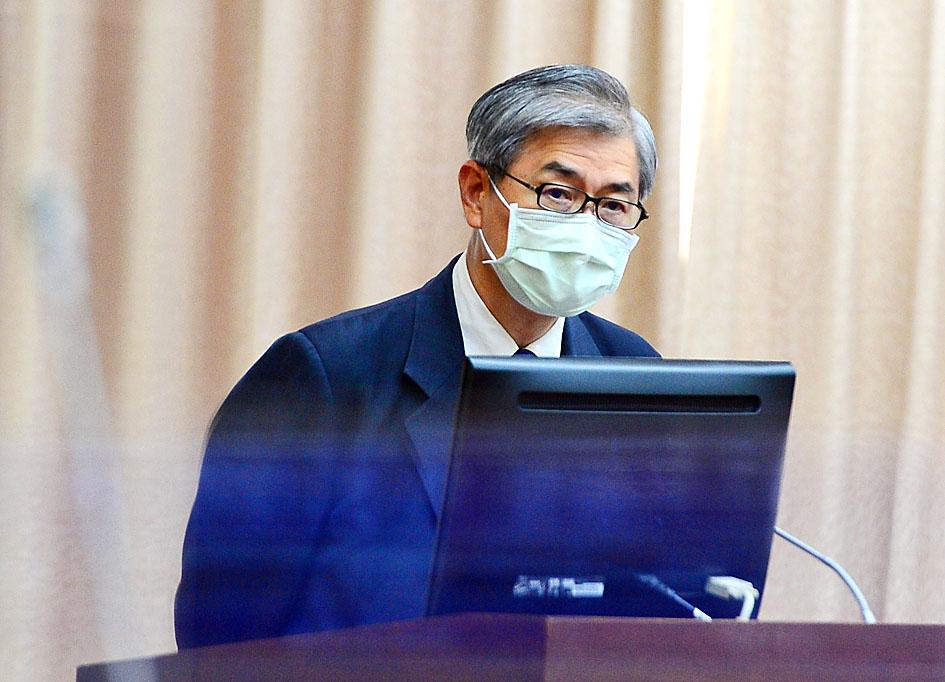Publicly traded companies might be allowed to delay their annual shareholders’ meetings until after next month given a surge in COVID-19 infections in Taiwan, Financial Supervisory Commission (FSC) Chairman Thomas Huang (黃天牧) said yesterday.
The commission would speak with the Ministry of Economic Affairs and the Ministry of Health and Welfare to reach a decision within two weeks, Huang told a meeting of the legislature’s Finance Committee in Taipei.
The Securities and Exchange Act (證交法) requires listed companies to hold their annual general meetings by the end of June or face a fine of NT$240,000 to NT$4.8 million (US$8,577 to US$171,539).

Photo: Wang Yi-sung, Taipei Times
The commission would look to the Special Act for Prevention, Relief and Revitalization Measures for Severe Pneumonia with Novel Pathogens (嚴重特殊傳染性肺炎防治及紓困振興條例) and study whether listed firms could be exempted from the requirements of, Huang said.
“The advantage [of delaying meetings] would be to reduce public gatherings and help contain the spread of COVID-19, but delaying them would affect stock-related affairs, such as dividend distributions,” he said.
Listed companies are required to announce their book closure dates at least 60 days before their shareholder meetings so they can finalize their shareholder rosters.
Only shareholders on the roster are eligible to attend the meetings.
If companies are permitted to delay the meetings to later than next month, they might need to reschedule the book-closure dates, which would also affect shareholders’ interests, Huang said.
The commission would weigh the pros and cons, he said.
Democratic Progressive Party Legislator Shen Fa-hui (沈發惠) told the committee meeting that many nations and other administrations have allowed firms to postpone shareholders’ meetings amid the pandemic, including China, Dubai, France, Germany, Singapore, Thailand, the UK, the US and Vietnam.
The commission is also mulling whether companies should be allowed to hold shareholder meetings via videoconferencing, but there are some technical issues.
Companies would find it difficult to authenticate shareholders’ identities online and count their real-time votes, Securities and Futures Bureau Deputy Director-General Tsai Li-ling (蔡麗玲) said on Tuesday.
Another problem is whether videoconferencing software allows sufficient overlapping log ins, Tsai said.
Moreover, if a videoconference breaks up or there is a bad connection, it would compromise shareholders’ rights, she said, adding that it is foreseeable that “controversies would occur.”
In related news, the commission said that the nation’s financial services would remain normal even if the COVID-19 alert is raised to level 4, while banks are encouraged to lower handling fees, as people would use online banking services and ATMs more instead of going to branches.

The US dollar was trading at NT$29.7 at 10am today on the Taipei Foreign Exchange, as the New Taiwan dollar gained NT$1.364 from the previous close last week. The NT dollar continued to rise today, after surging 3.07 percent on Friday. After opening at NT$30.91, the NT dollar gained more than NT$1 in just 15 minutes, briefly passing the NT$30 mark. Before the US Department of the Treasury's semi-annual currency report came out, expectations that the NT dollar would keep rising were already building. The NT dollar on Friday closed at NT$31.064, up by NT$0.953 — a 3.07 percent single-day gain. Today,

‘SHORT TERM’: The local currency would likely remain strong in the near term, driven by anticipated US trade pressure, capital inflows and expectations of a US Fed rate cut The US dollar is expected to fall below NT$30 in the near term, as traders anticipate increased pressure from Washington for Taiwan to allow the New Taiwan dollar to appreciate, Cathay United Bank (國泰世華銀行) chief economist Lin Chi-chao (林啟超) said. Following a sharp drop in the greenback against the NT dollar on Friday, Lin told the Central News Agency that the local currency is likely to remain strong in the short term, driven in part by market psychology surrounding anticipated US policy pressure. On Friday, the US dollar fell NT$0.953, or 3.07 percent, closing at NT$31.064 — its lowest level since Jan.

The New Taiwan dollar and Taiwanese stocks surged on signs that trade tensions between the world’s top two economies might start easing and as US tech earnings boosted the outlook of the nation’s semiconductor exports. The NT dollar strengthened as much as 3.8 percent versus the US dollar to 30.815, the biggest intraday gain since January 2011, closing at NT$31.064. The benchmark TAIEX jumped 2.73 percent to outperform the region’s equity gauges. Outlook for global trade improved after China said it is assessing possible trade talks with the US, providing a boost for the nation’s currency and shares. As the NT dollar

The Financial Supervisory Commission (FSC) yesterday met with some of the nation’s largest insurance companies as a skyrocketing New Taiwan dollar piles pressure on their hundreds of billions of dollars in US bond investments. The commission has asked some life insurance firms, among the biggest Asian holders of US debt, to discuss how the rapidly strengthening NT dollar has impacted their operations, people familiar with the matter said. The meeting took place as the NT dollar jumped as much as 5 percent yesterday, its biggest intraday gain in more than three decades. The local currency surged as exporters rushed to